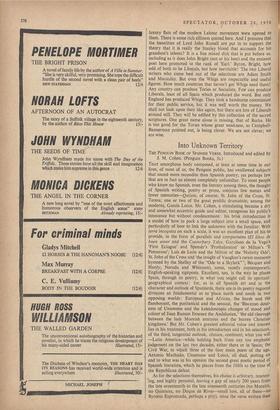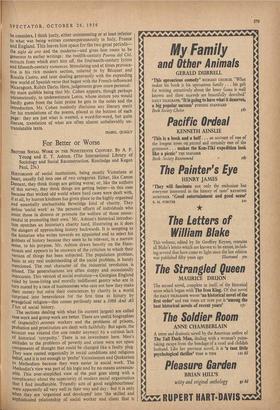Into Unknown Territory
THE PENGUIN BOOK OF SPANISH VERSE. Introduced and edited by J. M. Cohen. (Penguin Books, Ss.) THAT amorphous body composed, at least at some time in our liyes, of most of us, the Penguin public, has swallowed subjects that sound more recondite than Spanish poetry; yet perhaps few that are in fact so almost completely unfamiliar. To most people who know no Spanish, even the literary among them, the thought of Spanish writing, poetry or prose, conjures few names and fewer memories—Quijote, of course; St. John of the Cross, St. Teresa; one or two of the great prolific dramatists; among the moderns, Garcia Lorca. Mr. Cohen, a stimulating because a dry and somewhat eccentric guide and editor, recognises his public's innocence but without condescension : his brisk introduction is a model of how to pack a large subject into a small space, and particularly of how to link the unknown with the familiar. With terra incognita on such a scale, it was an excellent plan of his to provide, in the form of parallels and comparisons (El libro de buen amor and the Canterbury Tales, Garcilaso de la Vega's `First Eclogue' and Spenser's `Prothalamion' or Milton's 11 Penseroso'; Luis de Leon and the Milton of the 'Nativity Ode'; St. John of the Cross and `the insight of Vaughan's rarest moments hymned by the Shelley of the "Ode to a Skylark" '; Becquer and Hardy; Neruda and Whitman), some, mostly contemporary, English-speaking signposts. Excellent, too, is the way he places Spain, through its poetry, in what you might call its spiritual- geographical context : for, as in all Spanish art and in the character and outlook of Spaniards, there are in its poetry regional divisions so fundamental as to 'place north and south in two opposing worlds : European and African, the harsh and the flamboyant, the puritanical and the sensual, the `Biscayan dour- ness of Unamuno and the kaleidoscopic changes of mood and colour of Juan Ramon Jimenez the Andalusian,' the old cleavage between the lush Moorish emirates and the barren Christian kingdoms.' But Mr. Cohen's greatest editorial value and interest lies in his treatment, both in his introduction and in his selections, of the third, tangential outlook, climate, continent, what you will —Latin America—while holding back from any too emphatic judgement on the last two decades, either there or in Spain; the Civil War, in which three of the four main poets of the age, Antonio Machado, Unamuno and Lorca, all died, putting an end to what was in his opinion the second great poetic period of Spanish literature, which he places from the 1880s to the time Of the Republican defeat.
As for the selections themselves, his choice is arbitrary, interest- ing, and highly personal, leaving a gap of nearly 200 years from the late seventeenth to the late nineteenth centuries (no Moratfn, no Quintana, no Duque de Rivas—small loss, all of them—no Byronic Espronceda, perhaps a pity), since the verse written then he considers, I think justly, either uninteresting or at least inferior to what was being written contemporaneously in Italy, France and England. This leaves him space for the two great periods— the siglo de oro and the moderns—and gives him room to be generous to earlier writings: the twelfth-century Poema del Cid, extracts from which start him off, the fourteenth-century lyrists and fifteenth-century romances. Stimulating and at times provoca- tive is his rich modern section, ushered in by Becquer and Rosalfa Castro, and later dealing generously with the expanding new world of Spanish verse that began with the French-influenced Nicaraguan, Rubdn Dario. Here, judgements grow more personal : my main quibble being that Mr. Cohen appears, though perhaps unconsciously, to underestimate Lorca, whose stature you would hardly guess from the, faint praise he gets in the notes and the Introduction. Mr. Cohen modestly disclaims any literary merit for his translations of the poems, placed at the bottom of each Page: they are just what is wanted, a word-for-word, but quite literate, translation of what are often almost unbelievably un- translatable texts.
ISABEL QUIGLY











































 Previous page
Previous page